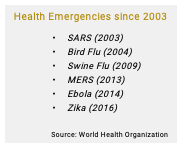Over the course of a few weeks, the coronavirus has emerged as a little-known outbreak from interior China to a highly publicized global health emergency.
For almost two years, the greatest cloud over markets stemmed from tensions over U.S.-China trade relations. Now, with the ink on the U.S.-China Phase One agreement hardly dry, a new threat from China has emerged: coronavirus. Within a matter of weeks, news of the viral outbreak floated from the back page to the headlines. It now seems as if we are inundated with frightening new updates throughout a single day.
After coinciding with a few negative market days last week, some investors are wondering, “could this ignite a shock to the global economy and severely impact markets?”
While the coronavirus is clearly menacing to those humans who come into contact with it, it doesn’t yet deserve the attention it is getting as a potential threat to bring down the global economy. Here’s why:
Evidence from Past Epidemics

Over the last two decades, there have been a series of epidemics garnering world attention. In each case, they were impactful to the lives they touched and deserving of a highly publicized, well-managed response. But also, in each case, none of these events created a market response large enough to be remembered.
It has now become the norm in our fast paced, globalized world that news also moves at light-speed. Sometimes, it even gets amplified to such a level that connecting points of cause and effect get overstated and amplified.
Maintaining Composure
A common phrase at Harman Wealth during times like now is, “What is newsworthy to the media isn’t always noteworthy to markets.” The reminder here is that what’s emotionally alarming at the news level doesn’t have the equivalent impact on the economy.
It is our guiding approach that markets are tethered to the economy underneath it. While markets can vacillate to a limited degree, it is the economy which dictates the big picture direction of markets. Even if the coronavirus breakout worsens further before it is contained, the truth is that it will only impact the global economy to a miniscule degree.
Checking In on 2020
From a market standpoint, there are number of potential risks to the U.S. economy, but the coronavirus outbreak is nowhere near the top. Our top concern is the very extended duration of the economic expansion. At ten and half years, it is the longest stretch of uninterrupted growth in history. Although we aren’t detecting recessionary forces just yet, we do know these growth periods do eventually come to an end.
Another concern is the dependency the present economy is placing on borrowing and lending. Over the last ten years, the pace of growth in borrowed money for households and commercial businesses has exceeded the growth in GDP. Therefore, balance sheets and debt-to-income ratios appear very stretched compared to historical standards.
Likewise, concerns are mounting about the exhaustive lengths central banks are willing to go in order to sustain the existing expansion. Historically, central banks have utilized monetary policy tools to counteract the forces of a recession while assisting the economy back to recovery. The pending problem we face in 2020 is the bag of conventional monetary policy tools is close to empty. Over the last several years, central banks have been reticent to fill it back up and, instead, folded to any form of market discontent while hoping a day of reckoning will never come.
Nonetheless, on a wave of central bank liquidity unleashed in 2019, the global economic trends are pointing to improving growth for 2020. Our outlook suggests staying aligned with further growth while continuing to lean into the more resilient end of the stock market – that means large caps, growth over value, and portions of high quality and low volatility stocks. It also means steering away from the riskier end of small caps, foreign developed, and emerging market stocks.
Interested in Adaptive Business Cycle Investing?
Today’s markets, economies, and policies are more complex than ever, challenging investors on what to watch and when to take action.
At Harman Wealth Management, we understand sound investments are uniquely supported by the conditions that favor them. Likewise, when conditions change, so do the investments that benefit.
That’s why we conduct rigorous and disciplined tracking of the U.S. business cycle. We also track the cyclical factors that shape our investing environment, like currencies, commodities, and rates. We embrace a world where investing dynamics are constantly evolving and believe it’s imperative to have an investment strategy that adapts with it.
With Adaptive Business Cycle Investing, we invest consistent with business cycle forces. We aim to align investments with the conditions driving returns in the present, rather than chasing what worked in the past.



